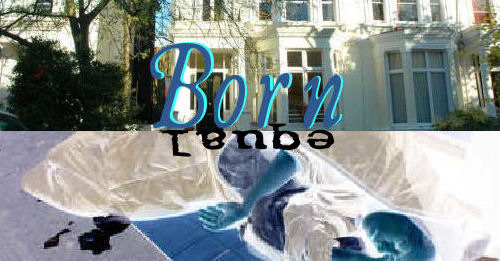 |
 |
 Introduction
IntroductionColin Firth, Anne-Marie Duff, David Oyelowo with Robert Carlyle head an all-star cast in BBC One's Born Equal, a major new drama from Bafta Award-winning writer and director Dominic Savage.
Savage's gritty films—including When I Was Twelve, Love + Hate, Out Of Control and Nice Girl—have all tackled contemporary social issues. In Born Equal, he addresses social inequality in Britain today through the interweaving stories of several characters whose paths collide in and around a B&B temporarily housing the homeless and dispossessed.
Mark (Colin Firth) is a wealthy City worker whose conscience and guilt about his luxurious lifestyle prompt him to try to help those less fortunate, but it results in turmoil for himself and others. Staying at the B&B are Michelle (Anne-Marie Duff), a pregnant mother with a young child, who has escaped an abusive husband; Yemi (David Oyelowo), his wife Itshe (Nikki Amuka-Bird) and their young daughter, Adanna, who have fled the threat of violence in their native Nigeria; and Robert (Robert Carlyle), newly released from prison and embarking on a search for his mother.
The stellar cast also includes Emilia Fox, Julia Davis, Megan Dodds, Nichola Burley, Emily Woof and Pearce Quigley.
All of the characters are struggling with personal crises—even Mark who, on the surface, has everything, explains Savage. "They are people in desperate circumstances and the film captures their intertwining, different lives. It's ultimately about people's relationships and the difficulties, dilemmas and moral issues they face."
Born Equal started life as a film about homelessness but, as Savage embarked upon his research, a markedly different film began to take shape. "When I began to look into the problem of homelessness, my sense was that there was a really big issue around people living in temporary accommodation for long periods of time."
"They're known as the ‘hidden homeless' because, although they've got a roof over their heads, it's far from being a home," says the director.
Savage visited a number of these hostels and met many different people who generously shared their stories with him—stories he says he will never forget. "I was struck by the diverse reasons why people end up in those places: a fall from grace, a relationship break-up, coming out of prison, leaving the Army, being a refugee."
"All of those different stories come together in this one place and, for me, that was the starting-point of the film."
One of the hostels Savage visited was located in London's Swiss Cottage, literally around the corner from a row of multi-million-pound homes. "I knew then that one of the issues I really wanted to deal with was the extremes of difference in people's lives—and, in a place like London, those extremes can be experienced within just a few streets. People can be in hugely different worlds but sharing the same space."
"The film shows huge contrasts between people and how they live, their ideas, what they've got and what they haven't got," says Savage, who points out that although the film is set in London, the same contrasts can be seen all over Britain.
Produced by Ruth Caleb and Lucy Hillman, the drama was completely improvised and filmed without rehearsal. It was a process described by David Oyelowo, who plays Yemi, as "the acting equivalent of extreme sports." Savage says: "It's the most organic way of making a film but also the most risky way because film-making is about delivering something people have an expectation about.
He shot two alternative endings to the drama and did not decide upon the final scenes until the very last moment.
"Working like this is more like a journey—the film keeps developing and changing as you shoot. It's exciting not quite knowing what you're going to get.
"You have a sense of it and you can talk about it with the actors in detail but then it's open to change and that's what I like. You're completely thinking on your feet.
"With the cast having so much input—not a single line of dialogue was scripted in advance—making the film became a very democratic process, he adds. "I think it was an incredibly liberating process for the actors and I was really interested in what their life experiences brought to it. It was vital that they didn't mind exposing certain elements of themselves," he says.
"For me, there was something about all of them that connected with the role they were playing. There was an element of reality in it for them and that was really important. They empathised and understood it, but also felt that they could give something quite personal to it.
For Savage, the film taps into the way a lot of people today are beginning to think about society, wealth and poverty, and the way we live now. "If you're fairly well-off, fairly comfortable, and you see people who aren't—who have nothing— living at the end of your road, you do start to think about it. It makes you think about these vast differences between our lives and that's what the film is about," he says. "I want people to go on a journey with the characters. If we, as an audience, care about them, irrespective of our preconceptions, that's what matters."
"In the end, what the film aspires to achieve is to encourage people to think more about others, care about the less fortunate and be more aware of what's going on around them.
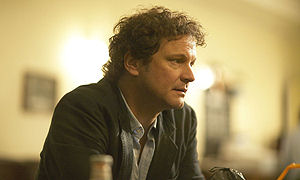 Colin Firth plays Mark
Colin Firth plays MarkColin Firth was constantly caught on the hop when he played City worker Mark in Dominic Savage's powerful new drama, Born Equal. With no lines, no rehearsals and sometimes no idea of quite where he'd be filming each day, the experience proved to be an utterly exhilarating ride for this Hollywood star.
Firth plays a wealthy, forty-something hedge fund manager, whose conscience and guilt about his luxurious lifestyle prompt him to try to help those less fortunate. Mark has money, status and a beautiful home, and his wife (played by Emilia Fox) is pregnant with their first child. But all he sees around him are people who have none of those things. He is moved to do something and volunteers to work on the streets with homeless people, alongside a charity outreach worker (played by Julia Davis). But Mark's actions ultimately have devastating consequences for both himself and others.
Firth jumped at the chance to play such a complex character—not least because director Dominic Savage offered him the opportunity to create the role from scratch for the fully improvised drama.
"The premise was that here is a man who goes through some change of outlook. He works in the world of big business, a world of self-interest, and it bothers him and for one reason or another he gets involved in working with homeless people. But it gets a bit too much for him—things happen to him that make it difficult for him to be too idealistic about it," explains the actor.
"I would hesitate to be simple about what's driving Mark because the way we worked on this film threw so many contradictory things at you about motives. My feeling was that I love seeing grey areas. I think most actors like to inhabit the grey areas because they're what we inhabit anyway, really—where the writer leaves off, we supply the rest.
Firth describes the process of making Born Equal as "extraordinary".
"I'd never done anything like this before, where there's absolutely no dialogue to begin with. You just jump in cold, which is a bizarre feeling, and you're flying by the seat of your pants all the time. You don't know how a scene is going to work out until it ends.
"What really sets it apart is the use of complete and utter randomness. One minute your attempt is catastrophic, the next something really illuminating comes out. You're discovering and creating as you go along and you often surprise yourself—and so do the other actors."
Though the temptation was great, he made a decision early on not to turn up for work with reams of notes about his character and deliberately shied away from coming up with lines unless a camera was rolling nearby.
"I decided that if it's going to be random, then I'd take it all the way and let it be really precarious. I really enjoyed allowing it to be absolutely unpredictable and I think I'd have compromised that if I'd done my homework.
"I was much more interested in what came out of my mouth in front of a camera than if I'd thought it up the night before in my bedroom. I'm someone who has a terrible habit of being punctilious in the way I speak and I think, if the camera's rolling and you've got a lot more pressure, a more truthful version will come.
For Firth, Mark's story really began to fall into place as the cameras rolled.
"For me, it was never simply a case of him being well-intentioned but naïve. I didn't want to see him behaving out of moral purity or idealism, I wanted it to be muddier than that," he says. "Perhaps some of what he goes through is a product of a mid-life crisis, problems with his marriage or his wanting to run away from something he feels trapped by—perhaps any of those things might create disillusion or fear in a middle-aged man. But I think it's far more interesting to try to tell a story about a guy who has a multitude of motivations and conflicts and whose failings are very apparent."
Indeed, things begin to spiral out of Mark's control when he tries to help Zoë (played by Nichola Burley), a desperate, teenage runaway who has chosen to sleep on the streets rather than return home to her violent and abusive stepfather.
At first glance, Mark and Zoë seem worlds apart but, says Firth, take a closer look and it becomes clear that they do have something in common. "I don't think it's just about middle-class versus sleeping rough. Mark is just as alienated from his life in his own bedroom as he is from life in some underpass," he points out. "However polarised Mark and Zoë's lives are, however different their experiences are, one thing they've both got in common is that they're both fugitives from something they find unbearable.
"In Zoë's case, it's far more immediate and understandable in that it's an abusive family, alcoholism and all the things that are easy to understand are a problem. In Mark's case, it's much less defined—but he doesn't want to go home either."
Born Equal has perhaps posed the most challenges for the versatile actor. He remains non-committal, for example, on the question of whether viewers will feel sympathy for Mark.
"He is sympathetic at moments but there are other times in the film when his behaviour is such that it's impossible to feel that. In trying to heal the wound or assuage his guilt or whatever, he ends up hurting a lot of people, almost everybody around him, in fact.
"In the context of a film that portrays problems like homelessness—things everyone agrees are real problems—it is hard to show someone struggling with things that many people would not consider problems. Now that will never change; you'll never convince some people that there can be problems if you're well-fed and wealthy."
"So in some ways I think it might be inappropriate to try to draw sympathy for Mark. But, whether you sympathise with him or not, it is how it is. People in comfort suffer, too—they just do. It's a plain fact. They can suffer very badly and they can suffer to the point that they destroy themselves. Choosing to suffer is a very complicated, weird thing. I think it's fantastic that Dominic's carved out a space for a glimpse of that in a story that is inherently about a much more palpable kind of misery."
Despite the film's clear social messages, Firth claims that he had no agenda when he embarked upon the project.
"I had absolutely none whatsoever," he says simply. "I just found it a fascinating way of working and thought all sorts of things might get thrown up, and it was exactly what I hoped it would be.
"I wouldn't have risked doing this sort of stuff if I didn't know that Dominic could pull it off. This convention is a very dangerous one to work in and I think things could fall apart very easily. But I think he pulls it off with spectacular success."
 Anne-Marie Duff plays Michelle
Anne-Marie Duff plays MichelleWaiting at King's Cross station, heavily pregnant, bloodied and bruised, proved a profoundly unsettling experience for actor Anne-Marie Duff. She was filming a scene in which her character, Michelle, has fled her abusive husband and arrived in London, where she knows no one and has nowhere to go. But, with the drama's naturalistic style of filming and skeleton crew, many of the commuters streaming past her would not have known that.
"It was fascinating and sad, really. Someone on the station staff came to ask if I was alright but that was it—no one else stopped," she says. "You think about it and you swear to yourself that you'd stop if you ever saw a young woman in that state. It was strange, it was like putting the world under a microscope."
In a sense, that is exactly what Savage's latest film sets out to do, exposing as it does the vast social inequalities that exist in cities across Britain where the fabulously wealthy and those with nothing live side by side.
"As an actor, you don't often get the opportunity to tell stories that have such pertinence," says Duff, who describes her decision to join the project as a "no-brainer". "It's a film that's really about something and that was important to me. But what's beautiful about it is that, although their world is very difficult, all of the characters are, in essence, good people—it’s just their circumstances or their life experiences that have made things hard for them."
Nevertheless, the actor says that playing Michelle was one of the most emotionally draining experiences of her life.
"When Michelle flees her husband, she leaves her whole life behind and it's almost like dealing with a bereavement. Walking away from a part of yourself and leaving all your goods and chattels…you don't know who you are, especially with a child," she says.
While researching the role, Duff contacted Women's Aid, a charity that runs refuges around the country that offer a lifeline to women and children who have experienced domestic abuse. "I went to a refuge and the women there were exceptionally helpful. I was very privileged to hear their stories," says the actor. "We talked about the nitty-gritty of what it's like to be in a relationship that is physically and emotionally violent, and what that does to you. It was almost Kafkaesque. You talk to these women and they all have very similar stories—it’s like they can hold up a mirror to each other's experiences. It was very helpful for me."
She soon realised that all of the women she met had "eventually come to the end of something."
"It was about going as far down as you can go and suddenly, I guess, a very primal urge kicks in to save your life or the life of your child."
For Duff, who lives in London, where the film was shot, one of the most heart-wrenching scenes is when Michelle finds herself alone with her daughter, Danielle (Gemma Barrett), for the first time in a temporary B&B for the homeless and dispossessed.
"Just before that scene, I had been talking to a real housing officer, a fantastic woman, and some of the statistics and facts she told me were absolutely terrifying. I asked how long it would take for someone like Michelle to get out of the hostel, to get their own place. I was thinking, she's pregnant and she has a child, so it can't be that long. And she said: 'Well, you're looking at about three and a half years.' "
"It was a shock. You think to yourself, we're all only a couple of steps away from that. If you lost your family, if you went off the rails, if you became ill… It really doesn't take a lot for your imagination to make the leap."
Working without a script for Born Equal was, however, a new challenge for Duff. She describes her first improvised scenes with Robert Carlyle (who plays Robert, a man Michelle meets in the hostel) as "both terrifying and empowering".
"I didn't know Robert and Dominic made a point of us not meeting before the filming, so we didn't have any shared preconceptions. So we got to know each other slowly, which was quite good, really. But it was weird on the very first day of filming because all we had to do was walk past each other in the corridor. There was all this fuss about not seeing each other and then there you were—it was a bit of an anticlimax!" she laughs. "It was a good way to work, though. You have to be very on your toes and Robert was lovely to work with."
"In some ways, it was more frightening improvising with Gemma [Barrett], who was playing my daughter and is only six. I found it very hard getting upset or being a mess in front of her, because I was always terrified of crossing some line. But, thankfully, she's very sound and comes from a really great family, so it wasn't complicated for her—she knew we were pretending."
Duff believes that the relationship that develops between Michelle and Robert reveals a great deal about the kind of people they are.
"You know for Michelle that it's a fantasy, really—she’s clinging to a life raft. I think, for both of them, it's more a sense of just trying to find somebody," she says. "I also think that these hostels can be strange little microcosms. They suddenly become your whole world and Mother Nature does weird things in situations like that. You know, it happens when you work in offices or on film sets, too: you might start a job not being very attracted to people but, at the end of it, you find you're very attracted to someone you wouldn't normally be..."
Having just played a woman who is eight months pregnant, Duff does reveal that she is currently feeling "even more broody than ever."
"I had to wear all this padding and it was great—it’s lovely having a belly. You get to practise being pregnant!" she laughs. "It looked so good, as well. The paramedic we had on set one day told me I should be sitting down and asked how long I had to go, and even the midwives were impressed when we were filming in the maternity ward. Yep, the belly was a big hit all round!"
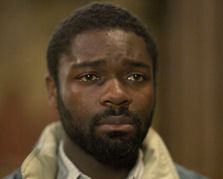 David Oyelowo plays Yemi
David Oyelowo plays YemiWhen he first walked into the B&B that forms the backdrop to Born Equal, David Oyelowo almost believed someone had turned back the clock. Seventeen years earlier, he and his family had lived in a similar hostel in London after leaving their native Nigeria. It was, he reveals, just one of the many reasons why Dominic Savage's hard-hitting drama affected him so deeply.
One of Britain's finest young actors, Oyelowo plays Yemi, a Nigerian journalist who winds up in the hostel having fled his home with his wife (played by Nikki Amuka-Bird) and young daughter after writing controversial articles about the situation in the troubled north of his country.
"The story stems from the problems in the northern states of Nigeria," explains the 30-year-old actor, who was born in Oxford but grew up in Lagos. "There's a lot of oppression of Christians there and Yemi's father is a pastor who has suffered a great deal in the conflict, so you can see where the impetus came from for him to write these articles. When Yemi is threatened, he feels he has to take his family out of the country for their safety. But then he finds out that, because of his articles, his father and his father's congregation are being persecuted. So there are a lot of things going on with him. He has this acute guilt for having displaced his immediate family, and the guilt about what's happening to his father. But he also feels that he's done the right thing: if he doesn't speak out, who will? So there's a lot of conflict going on in the man's head and heart."
To research the role, Oyelowo talked to two Nigerians whose real-life experiences were brought together in Yemi's story.
"One of the people I met is a journalist who is seeking asylum in this country. His parents are Christians and they live in Nigeria, and he had written some controversial articles that meant that he'd been forced into hiding. He lost contact with his family and ended up having to come here to seek asylum," he says. "We talked about the nightmares he'd experienced. When I last spoke to him, his request for asylum had been turned down twice and he was applying again."
Oyelowo also spoke to a Nigerian pastor who is caught up in the problems in the north. "He's had his church shot at several times, he's seen Christians killed and his life has been threatened, but his view is that it's his calling from God to be there and he's not going to leave."
The actor was profoundly affected by what both men had been through. "It had a huge affect on me, not least because I am Nigerian. I left in 1989 and have been back sporadically since then, and it was really shocking to me that this was happening. And I'm a Christian myself, so there was a double resonance for me," he says. "But also, as an actor, you feel a need to be very true to what's going on—I knew that I had a job, a responsibility, to tell the story well because we were very much borrowing these people's stories for the film and everything we talk about actually happened to them."
"Being truthful," he adds, is at the core of director Dominic Savage's approach to film-making. This approach relies heavily on improvisation, which Oyelowo describes as "the acting equivalent of extreme sports."
"You literally throw yourself at the wall and see what happens," he smiles. "As an actor, you're constantly looking for new challenges, things that are going to shake you up. And I'm kind of an all-or-nothing actor—I like throwing myself completely and wholeheartedly into things—and and so I found it creatively very stimulating. The only things you have to draw on are your emotions and your understanding of the character at that particular point in time."
Oyelowo was also able to draw on his own memories of living in a hostel back in 1989. At that time, he and his family had lived in Nigeria for seven years but made the decision to return to Britain during a period of intense political unrest in West Africa.
"When we arrived in London, my mum and my two brothers and I had to live in a place not dissimilar to the one Yemi and his family find themselves in, so I have first-hand experience of that and what's in the film is very accurate," says Oyelowo, who was just 14 at the time. "Yes, it is a frightening place to find yourself but there are an awful lot of people, not necessarily impoverished, who just find themselves in that situation.
"Looking back to that time was, in a way, kind of wonderful for me because I thought: 'Wow, we've come a long way!'"
Musing on his recent roles, Oyelowo says that what gets him going as both a viewer and an actor is "work that really has something to say. That's why I was so keen to get involved in Born Equal. It's not dissimilar to Shoot The Messenger—it ticks the same sort of boxes," he says, adding that he believes Savage's film brilliantly captures what he calls "the syndrome of the city—the weird dichotomy of being surrounded by people but completely alone—and I think that's what Born Equal very much illustrates. Everyone's busy, buzzing around, doing their own thing and often we don't see or even recognise the people who've slipped through the cracks of society. That's a real indictment of our culture and our cities, in a way. But I think this film will really make us take a look at ourselves."
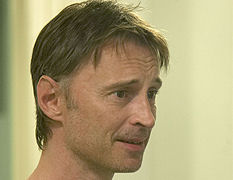 Robert Carlyle plays Robert
Robert Carlyle plays RobertScots star Robert Carlyle is no stranger to characters who stalk the underbelly of society. Good guys who have fallen through the cracks, bad guys trying to be good, criminals, villains and the odd murderous psychopath have all strong-armed their way onto his CV over the last 20 years. But, he says, that's not the only reason why Born Equal's Robert feels so familiar to him.
Robert has just been released from prison and is searching for his mother. Dislocated from society, he's trying to make a clean start and thinks that finding his mother will help him on that road.
"It's difficult to explain without sounding very grand but if I was an artist who used paint and a canvas, then you could consider this to be the latest in a series of self-portraits, if you know what I mean—maybe me in another life and another time and another path," says Carlyle in his soft Glaswegian accent. "I've kind of been sketching out that character over and over again in different guises. It's something that every actor does, in a sense—you use yourself—and I'm kind of interpreting Robert Carlyle in maybe six or seven of these parts now. They all come from pretty much the same place and pretty much the same world, but they're all very different. And there are aspects in there that obviously relate to me and some that don't."
Carlyle believes he's come across enough characters like Robert in his life to be able to relate to him.
"I know a lot of people and I've got a lot of reference points for this kind of work. Did I feel a connection to Robert? I understand him, I think that's probably closer to it. I understand the type of character Dominic wanted to see. It's someone who's familiar to me," he says. "It's interesting because I'm 45 now and I think that a lot of guys get to this age and suddenly realise that their life's kind of passing them by."
"Robert certainly does and he finds himself wanting to repair the past. He commits himself to searching for his mother. He feels that will in some way help him to integrate properly into the world, into society—a society he's rejected most of his life. So he embarks upon this journey, without really knowing what to expect along the way."
Penniless and with nowhere to go, Robert is given a room in a B&B but, as he wanders around the streets of London and catches glimpses of the lives of the wealthy people who live all around him, he develops an acute sense of the inequalities that define the city. "He really is stuck, disenfranchised from everything. Everything in every shop window is beyond his reach. Every house he passes by, every flat, every tower block is outwith his grasp," explains Carlyle.
"I think it's probably impossible for any one of us to imagine ourselves in that kind of scenario. But I can empathise and I can sympathise and I can do all that I can to understand it."
At the heart of Born Equal is a love story—a love story that ultimately can never be, says the actor. In the hostel, Robert meets Michelle (played by Anne-Marie Duff), who is pregnant and has a six-year-old daughter, Danielle (Gemma Barrett). Michelle has escaped an abusive husband and, alone and desperate, she and Robert reach out to one another. "The tragedy is that they are actually very well suited. In another life, in another time, they could be together quite happily, but I don't think Robert's capable of it, that's the problem," says Carlyle. "He's got too many demons, too much to sort out. And as the search for his mother starts to go wrong, you can see how out of reach this guy actually is. There's virtually nothing behind him, no foundation."
"If something's got some sort of social aspect to it, it's always good and it makes it a little easier to justify doing it," admits the actor. "I don't think Born Equal is overtly political. But then again, you see homeless people on the streets everywhere you look and of course it's political, it just doesn't necessarily look that way."
What did attract him to the film, however, was the prospect of working with director Dominic Savage, who is renowned for his extreme dedication to the art of improvisation.
"I'd seen Dominic's Out Of Control, which I thought was terrific, and I was aware of this reputation he has of being a maverick in the way that he works and that's right up my street," he smiles. A veteran of improvisational theatre and film, the actor had no qualms about the lack of scripted lines. "It's a fantastic way of working, it's how I started in a sense, and I love that element of surprise, not quite knowing what is going to happen next. You're not going home at night, looking at lines … I never do that anyway. And I'm the world's worst rehearser—I hate rehearsing anything at all, it kills it for me, so this is perfect," he laughs.
"When you work like this, you maybe live it a little bit more. Everything comes from inside and Dominic takes a lot of credit for that. What you need is a platform, someone who's going to be encouraging and allow that to take place and that's definitely one of Dominic's great talents. What also really helped is that Anne-Marie [Duff] and I got on very well together, very quickly. We were able to achieve that state of reality, I think, which is unusual for people who don't really know each other that well. It's all about trust at the end of the day; if you trust your fellow actors, you're flying."
Carlyle was also amused by Savage's fondness for what he calls "guerrilla filming"—eschewing a closed set for filming out on the street among members of the public. "It's all about grabbing a camera and seeing what you can get and, even though I'm used to doing that, it was funny. A few of us were jumping on and off tube trains one day and to see all the women on the train doing double-takes at Colin Firth … they must have thought they were in a parallel world!"
"I go into that world every so often, the big-budget world, and then I run away to get my head back together again." Born Equal, he adds, helped him do just that. "I really wanted to get out of bed in the morning and go to work, and that's as big a compliment as you can pay, really. I felt that it was a good thing from start to finish. Everyone understood what Dominic wanted to do and went along with it—a lovely experience.
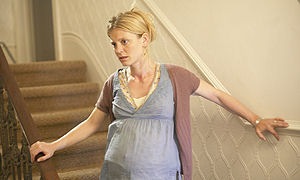 |
Emilia Fox is Laura In Born Equal, Emilia Fox plays Laura, the pregnant wife of Colin Firth's character Mark. |
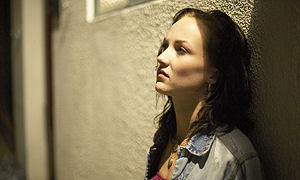 |
Nichola Burley is Zoë Born Equal is Nichola's second feature film. In it, she plays the role of Zoë who has run away from home because of her abusive stepfather. Colin Firth's character tries to help and befriend her, but she misinterprets his actions. |
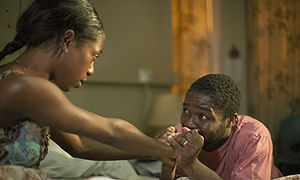 |
Nikki
Amuka-Bird is Itshe Nikki plays the role of Itshe, the wife of David Oyelowo's character, Yemi, who have both fled their native Nigeria with their young daughter. |
|
|||
Click on boots to contact me  |
|||